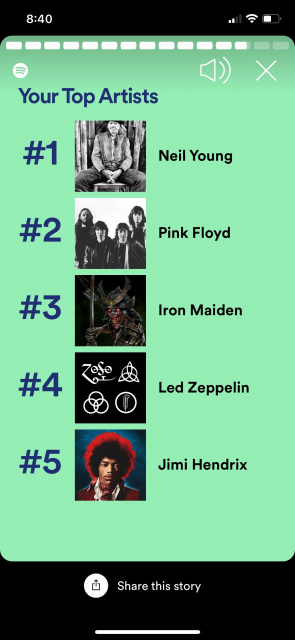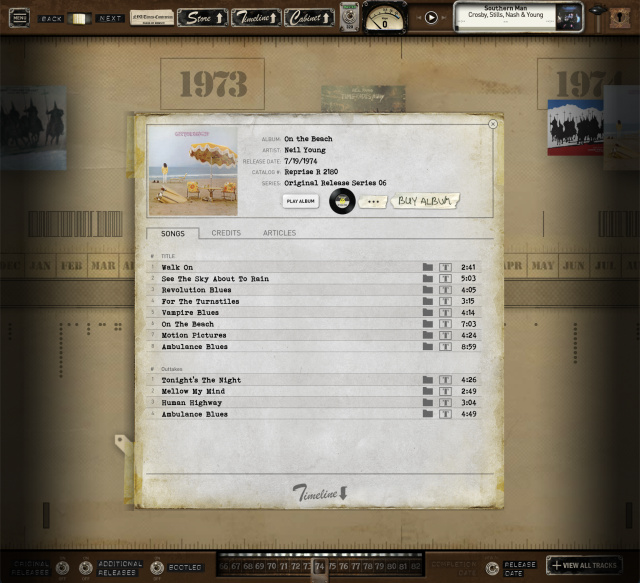If someone behaves exactly like a far right activist it doesn't matter what they believe in their heart. Debate should center around known actions, not unknowable motivations.
tech-culture
"Zuckerberg said Meta will use predictive AI models to guess what our legs are doing based on our upper-body movements. No other popular AR/VR hardware maker has been able to do this yet. But it isn’t out of the realm of possibility for Meta, a company with one of the largest staffs of engineers in the world that is spending $10 billion a year on metaverse projects alone."Why is our society like this?
Spotify, Wrapped
I would like to announce that I have ended my business relationship with Spotify. That means I'm no longer paying Spotify $15/month for a family account. With Neil Young off the platform, they're literally removing the music I listen to most. Here's my 2021 Spotify Wrapped top artists list. (And keep the judgy looks to a minimum—we all got through 2021 our own way.)

I agree with Neil Young (and Joni Mitchell and Nils Lofgren and Brené Brown) that it's not good to support a company that refuses to remove public health disinformation.
Not everyone in my family plays their carefully curated Neil Young playlist 24/7 so they weren't as eager to jump ship. We all agreed that moving to a new service was good, but we couldn't agree which service to move to. We rarely sit down and put together our technical requirements for a digital service as a family. So we assembed our RFP and we're waiting on the contracts from Procurement.
In the end we found a music service from a company with no problematic stances: Amazon Music. I'm kidding, of course. Chances are very good that I'm going to want to leave this service in the near future and maybe that will be the environment we're in until there's real competition. Neil Young recommends Amazon and he has a deal that will give new users four months free.
The biggest barrier to moving services was moving our playlists. I found an app for that that works well: Free Your Music. It costs $15, but I look at that like a moving services tax. Hopefully that's a one-time fee. I had 30+ playlists to move over and I've only found a few mismatches here and there that were easy to fix.
If anyone else is a hardcore Neil Young fan it's worth checking out his Neil Young Archives website. (Thanks for the gift subscription, Dad!) The central music services are kind of like fancy spreadsheets to me. They make navigating songs easy but treat all artists the same. Looking through the Neil Young Archives is more like rifling through a dusty trunk where there's all kinds of bizarre things to find. It looks like this:

Truly awful if you're trying to get something done efficiently. Awesome if you want to have a feeling of discovery. We have a lot of "efficient" experiences online and I think we could use more planned weirdness.
Anyway, Spotify is a good, efficient music service. They must view podcasts as the future of their business if they're willing to both be bad citizens and degrade their music offering to keep those listeners.

I agree with Neil Young (and Joni Mitchell and Nils Lofgren and Brené Brown) that it's not good to support a company that refuses to remove public health disinformation.
Not everyone in my family plays their carefully curated Neil Young playlist 24/7 so they weren't as eager to jump ship. We all agreed that moving to a new service was good, but we couldn't agree which service to move to. We rarely sit down and put together our technical requirements for a digital service as a family. So we assembed our RFP and we're waiting on the contracts from Procurement.
In the end we found a music service from a company with no problematic stances: Amazon Music. I'm kidding, of course. Chances are very good that I'm going to want to leave this service in the near future and maybe that will be the environment we're in until there's real competition. Neil Young recommends Amazon and he has a deal that will give new users four months free.
The biggest barrier to moving services was moving our playlists. I found an app for that that works well: Free Your Music. It costs $15, but I look at that like a moving services tax. Hopefully that's a one-time fee. I had 30+ playlists to move over and I've only found a few mismatches here and there that were easy to fix.
If anyone else is a hardcore Neil Young fan it's worth checking out his Neil Young Archives website. (Thanks for the gift subscription, Dad!) The central music services are kind of like fancy spreadsheets to me. They make navigating songs easy but treat all artists the same. Looking through the Neil Young Archives is more like rifling through a dusty trunk where there's all kinds of bizarre things to find. It looks like this:

Truly awful if you're trying to get something done efficiently. Awesome if you want to have a feeling of discovery. We have a lot of "efficient" experiences online and I think we could use more planned weirdness.
Anyway, Spotify is a good, efficient music service. They must view podcasts as the future of their business if they're willing to both be bad citizens and degrade their music offering to keep those listeners.
"A Substack spokesperson referred the Guardian to an essay published on Wednesday by the platform’s co-founders, Chris Best, Hamish McKenzie and Jairaj Sethi, in which they said silencing vaccine sceptics would not work. “As we face growing pressure to censor content published on Substack that to some seems dubious or objectionable, our answer remains the same: we make decisions based on principles not PR, we will defend free expression, and we will stick to our hands-off approach to content moderation,” they said."Translation: we at Substack make too much money to be responsible citizens. Let's see how this 'hands off' approach works out for them.
“With an estimated 11 million listeners per episode, JRE, which is hosted exclusively on Spotify, is the world’s largest podcast and has tremendous influence,” the letter reads. “Spotify has a responsibility to mitigate the spread of misinformation on its platform, though the company presently has no misinformation policy.”Yes, cranky Neil Young, haha yes! This would remove most of what I listen to on Spotify. If Pink Floyd could get in on this they could wipe out everything. I should get our family to quit Spotify anyway.
Update: Spotify stands by their man. Everybody knows this is nowhere.
"As more and more of our lives start to be run and dictated by the technology we use, it's a human right to be able to see how that technology works and modify it. It’s as key to freedom as freedom of speech or freedom of religion. So that is what I plan to spend the rest of my life fighting for."Nice profile of Matt Mullenweg and WordPress—which is still a force on the Web.
"There is no one who could meaningfully tell him no, both because he owns 58 percent of the company’s voting shares and is also the chairman of its board, but also because Facebook is organized such that he effectively has the final say on every decision the company makes; no other company this size invests so much formal or informal power in one person. It’s a terrible thing to say about someone, but Mark Zuckerberg really is Facebook. It shows."Excellent Zuckerant.
“For small and medium companies, I generally recommend cloud services, because they don't have the people or the skills to run their own systems as securely,” Bellovin said. “But there are real but imponderable risks to one company controlling so much of the net.”Nope, worth pondering!
Interoperability is the simple idea that new services should be able to plug into dominant ones. An interoperable Facebook would mean that you wouldn’t have to choose between leaving Facebook and continuing to socialize with the friends, communities and customers you have there.Several concrete steps that could help reduce Facebook's harm and a nice summary of various shapes regulation could take.
I'm not on Facebook but I would love to have RSS of my friends' Facebook feeds. Then I could see their posts and read them along with the blogs and other news sources I read (in chronological order) every day.
"The exposed data includes the personal information of over 533 million Facebook users from 106 countries, including over 32 million records on users in the US, 11 million on users in the UK, and 6 million on users in India. It includes their phone numbers, Facebook IDs, full names, locations, birthdates, bios, and, in some cases, email addresses."Is this even considered news anymore?
"They also began raising concerns about safety in Amazon’s warehouses at the start of the pandemic. Amazon fired Ms. Costa and Ms. Cunningham last April, not long after their group had announced an internal event for warehouse workers to speak to tech employees about their workplace conditions."This is powerful. When employees speak to each other it can lead to realizing that they have common interests--even when they work in different parts of the organization that don't normally interact. Firing people advocating for safety during a pandemic is a bad look.
"Over the past decade, the blockchain has become a refuge for people who need another place to rest their assets. For global tycoons, it’s just an alternative to parking their money in some real estate they would never visit."Anil Dash (father of the NFT?!) on its origin and the current state of his problem child.